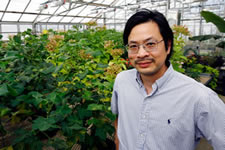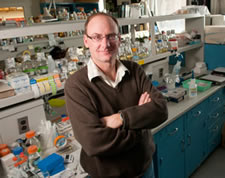Two AgBioResearch scientists named AAAS fellows
MSU AgBioResearch scientists Sheng Yang He and Gregg Howe have been nationally recognized as AAAS fellows by the American Association for the Advancement of Science.
Two Michigan State University (MSU) AgBioResearch scientists are among a record nine MSU researchers who have been nationally recognized as AAAS fellows by the American Association for the Advancement of Science. 
The two AgBioResearch scientists are Sheng Yang He, professor of plant biology, and Gregg Howe, professor of biochemistry and molecular biology. Other MSU faculty members honored are Christoph Adami, professor of microbiology; R. Sekhar Chivukula, associate dean of the College of Natural Science and professor of physics; Jeffrey Conner, professor of plant biology; Megan Donahue, professor of astronomy; Piotr Piecuch, university distinguished professor of chemistry; Thomas D. Sharkey, chairperson and professor of biochemistry and molecular biology; and Elizabeth H. Simmons, dean of Lyman Briggs College and professor of physics.
During the past three years, 20 MSU faculty members have been named AAAS fellows. The annual awards are peer-driven, so the most awards in the university’s history is worth celebrating, said Ian Gray, vice president for research and graduate studies at MSU.
“MSU’s researchers are solving problems related to food safety, the environment, sustainable energy, health and much more all around the world on a daily basis,” he said. “To have so many of our scientists recognized in a single year is particularly satisfying.”
He, who also was recently named a Howard Hughes Medical Institute and the Gordon and Betty Moore Foundation investigator, focuses on molecular interactions between plants and pathogenic bacteria. Despite the ability to mount myriad immune responses, every plant or animal is still highly susceptible to numerous pathogens. Explaining the molecular basis of disease susceptibility is of fundamental importance in medicine and agriculture because it holds a key to globally understanding infectious diseases in plants and humans. He and associates have made a series of discoveries of how bacterial virulence factors manipulate host innate immunity, jasmonate signaling, vesicle trafficking and stomatal functions in plants.
“It is a great honor to be named an AAAS fellow,” He said. “It has been wonderful to work at MSU along with my past and current students and research associates who made a number of memorable discoveries. Many outstanding plant and microbial colleagues at MSU have continuously inspired us to explore new areas of research. Indeed, I am very glad to receive this recognition along with my colleague and long-time collaborator Professor Gregg Howe.”
Howe aims to understand how plants respond to insect herbivory and other forms of wound stress. Howe uses tomato and Arabidopsis as experimental model systems to explain the mechanism of synthesis and action of the plant hormone jasmonate, and to study the molecular evolution of chemical traits that shape plant-insect interactions. These projects provide training in several areas of modern plant biology, including: analysis of protein-protein and receptor-hormone interactions; transcriptional networks; plant development; genetics of plant-insect interactions; protein biochemistry/proteomics; metabolism and metabolomics; and crop improvement for insect resistance.
“It is truly an honor to be named an AAAS fellow,” Howe said. “I greatly appreciate the wonderful colleagues and supportive research environment that make MSU a world-class institution for plant science research. I am particularly grateful for the privilege of having worked with many talented graduate students, undergraduates and postdoctoral researchers whose hard work and dedication have made this award possible.”
Nearly 540 AAAS members were selected as AAAS fellows for 2012. The winners will be recognized at a Feb. 18 forum during the AAAS annual meeting in Vancouver, B.C., Canada. The tradition of naming AAAS fellow began in 1874.
The AAAS is the world’s largest general scientific society and publisher of the journal Science and other publications. The AAAS was founded in 1848 and includes some 262 affiliated societies and academies of science serving 10 million individuals.
Photos: MSU AgBioResearch scientists Sheng Yang He and Gregg Howe. Both were recently recognized as AAAS fellows by the American Association for the Advancement of Science.



 Print
Print Email
Email




